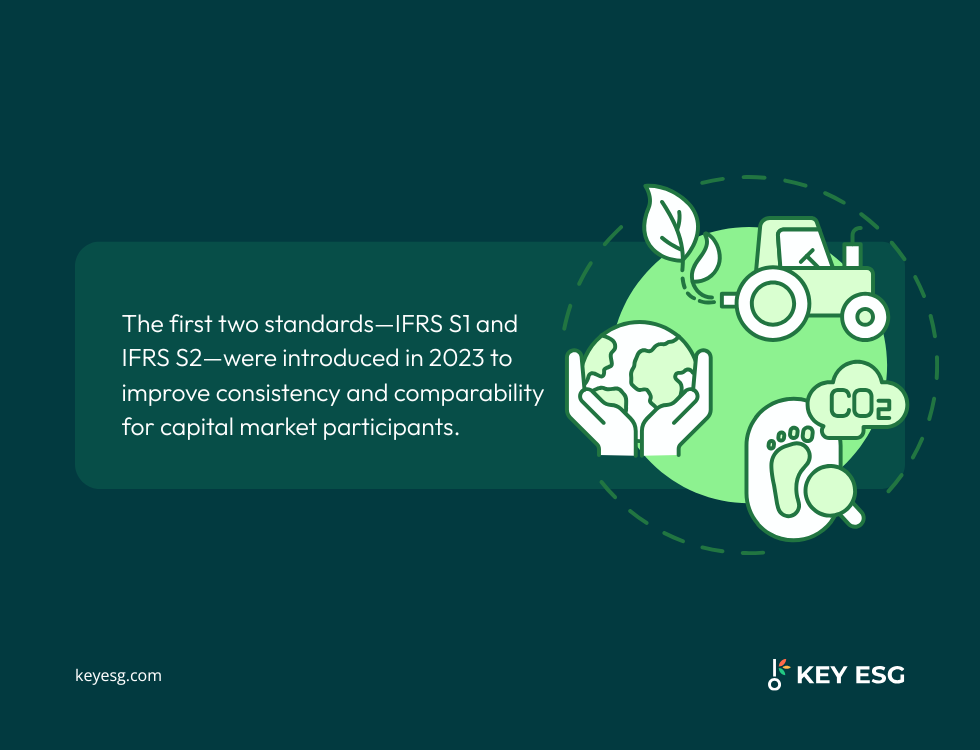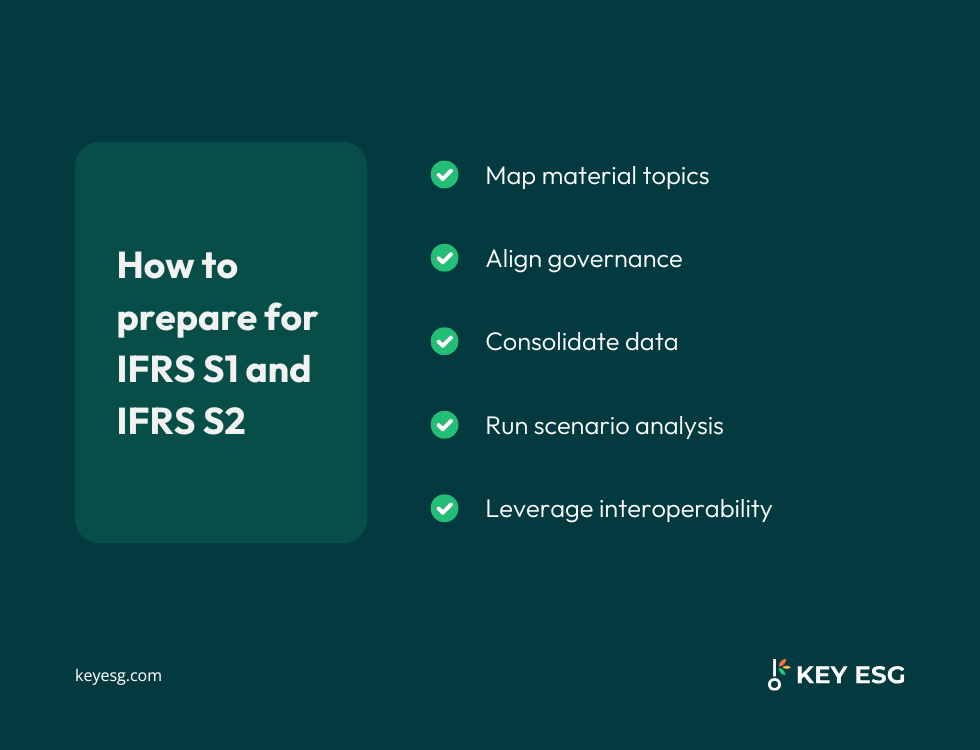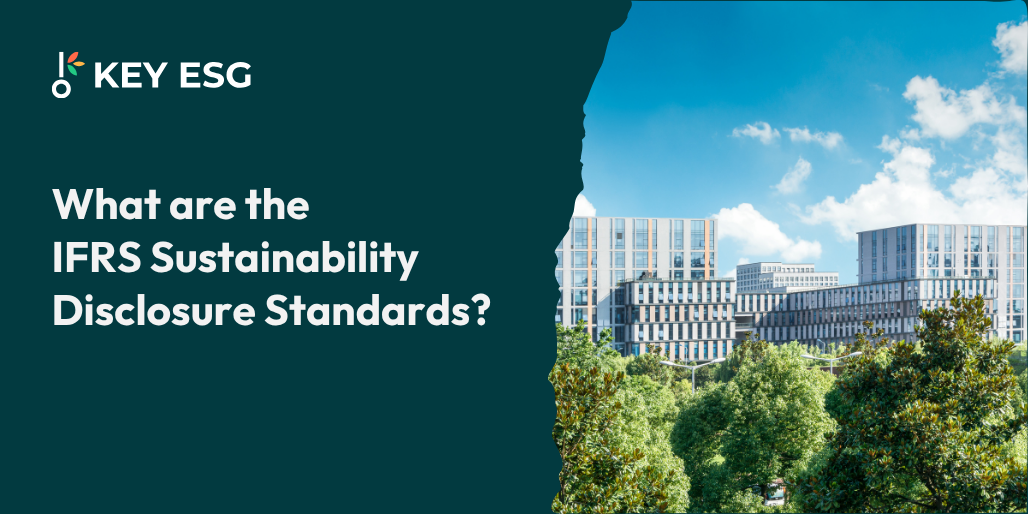The IFRS Sustainability Disclosure Standards mark a turning point in corporate transparency around sustainability reporting.
The standards provide a single global baseline for sustainability-related financial disclosures, and represent a new era of more harmonised sustainability-related disclosures and reporting standards worldwide.
For businesses, the shift means that sustainability performance will soon be measured, assured, and compared with the same rigour as financial results. That makes preparation critical for investor confidence and regulatory readiness.
What is the International Sustainability Standards Board (ISSB)?

In 2021, the International Sustainability Standards Board (ISSB) was developed by the International Financial Reporting Standards (IFRS) at COP26 in Glasgow. The ISSB established a consistent global baseline for decision-useful sustainability information in general-purpose financial reports, complementing the work of the International Accounting Standards Board (IASB).
Its first two standards, IFRS S1 and IFRS S2, were issued in 2023 to enhance the comparability of sustainability-related financial information for capital-market participants.
IFRS S1 – General requirements
IFRS S1 establishes general guidelines for the disclosure of sustainability-related financial information. It's useful to users of financial reports when making decisions related to an organisation’s resources and exposure to climate-related risks.
The standard requires disclosure of sustainability-related risks and opportunities that could impact an entity's cash flows, access to finance, or cost of capital in the short-, medium-, or long term. IFRS S1 sets the framework for how these disclosures should be prepared and presented, ensuring they are useful during decision-making processes.
IFRS S1 requires firms to disclose information that helps decision-makers to understand:
- Governance processes for overseeing sustainability risks and opportunities
- Strategy and how sustainability factors affect the business model and the company’s prospects
- Risk management processes to identify, assess, prioritise, and monitor issues
- Metrics and targets (including performance and progress against targets). This establishes a consistent structure across industries and reporting periods for sustainability-related financial information.
IFRS S2 – Climate-related disclosures
IFRS S2 focuses on climate-related risks and opportunities, building on TCFD architecture. Entities disclose:
- Transition and physical risks, and climate-related opportunities
- Metrics and targets, including greenhouse gas emissions (Scope 1, 2 and relevant Scope 3)
- Scenario analysis and resilience of strategy under different climate pathways
- Industry-based metrics (leveraging SASB topics where applicable). The aim is decision-useful, comparable climate information for investors and other stakeholders.
Interoperability with ESRS (CSRD)
As global regulations expand, many multinational companies must report under both the EU’s CSRD using the European Sustainability Reporting Standards (ESRS) and the ISSB’s IFRS Sustainability Disclosure Standards (S1 and S2). To prevent duplication and reduce reporting costs, the IFRS Foundation and EFRAG released interoperability guidance that maps the overlap between ESRS and IFRS S2.
For global businesses, this convergence simplifies compliance. It helps ensure that sustainability-related financial information is decision-useful across markets, supporting both regulatory obligations in the EU and investor confidence worldwide.
A global adoption snapshot

Momentum behind the IFRS Sustainability Disclosure Standards continues to build as more jurisdictions integrate them into their national reporting frameworks. Governments and regulators are recognising the ISSB’s standards as the global baseline for sustainability-related financial disclosures, promoting consistency for investors and multinational companies.
This momentum reflects a shared aim: to create a single, comparable approach to sustainability reporting that reduces duplication, aligns with financial reporting standards, and supports informed capital allocation.
Australia
The AASB S2 (climate) and AASB S1 (general) standards were finalised in late 2024 and are fully aligned with the ISSB. Mandatory climate reporting applies to financial years beginning on or after 1 January 2025, with thresholds based on company size and turnover.
United Kingdom
The UK government will make ISSB-based UK standards available in early 2025, with formal endorsement by mid-2025. Listed companies are expected to begin reporting from January 2026, pending FCA rules.
Brazil
The Comissão de Valores Mobiliários (CVM) has adopted the ISSB standards, signaling mandatory application for listed companies starting with fiscal years after January 1, 2026.
Malaysia and Nigeria
Both appear among the 17 jurisdictions for which the IFRS Foundation has published full “jurisdictional profiles.” Both are targeting the full adoption of the ISSB Standards, rather than a limited climate-only adoption.
Global momentum
By June 2025, the IFRS Foundation confirmed that 36 jurisdictions had adopted, were using, or were finalising the integration of the ISSB. Of the 17 profiled jurisdictions
- 14 have stated full adoption
- Two are targeting climate-only adoption
- One has partial adoption
These developments show that IFRS S1 and S2 are becoming the reporting baseline for sustainability-related financial disclosures. For companies operating globally, this means that the risk of multiple, divergent frameworks is diminishing, and the opportunity to streamline reporting and assurance is growing.
How to prepare for IFRS S1 and IFRS S2

Preparing for the IFRS Sustainability Disclosure Standards requires aligning governance, strategy, and risk processes around consistent and verifiable sustainability information.
The following steps outline a practical approach to readiness.
1. Map material topics
Identify the sustainability-related risks and opportunities most relevant to your business model and stakeholders. This keeps reporting focused on the issues that matter most to your organisation.
2. Align governance
Clarify who oversees sustainability issues and how progress will be reported to the board. Clear roles and oversight ensure more consistent and credible reporting.
3. Consolidate data
Centralise activity data and documentation for all relevant metrics and targets. This includes emissions and financial impacts. Bringing data together makes reporting faster, simpler, and easier to verify.
4. Run scenario analysis
Evaluate how your business model performs under different climate scenarios and disclose key assumptions. This helps you understand risks and plan for different possible outcomes.
5. Leverage interoperability
If your organisation also reports under ESRS, use the joint interoperability guidance to avoid duplication and fill only small disclosure gaps. Using shared frameworks saves time and reduces reporting effort across markets.
Early preparation will help companies meet the expectations of investors. It will also demonstrate leadership ahead of mandatory timelines.
How KEY ESG helps with disclosure
Adopting the IFRS Sustainability Disclosure Standards can be a complex process. The challenge is that data is often scattered across teams and systems. KEY ESG streamlines the process by providing a single platform that connects people, data, and frameworks.
With our software, compliance becomes an integrated part of business performance management.
- Collect: Centralise all sustainability data in one workspace and collaborate efficiently across departments, business units and geographies.
- Comply: Stay compliant as regulations evolve, with built-in mappings to ISSB/IFRS SDS, ESRS, CSRD, SFDR, and other frameworks.
- Report: Generate regulator-ready reports with clear visuals, drill-downs, and exportable audit trails aligned to general-purpose financial reporting needs.
- Improve: Benchmark performance, set measurable targets, assign actions, and track progress toward climate-related goals.
- Carbon Accounting: Automate Scope 1, 2, and 3 carbon calculations using 70,000+ emission factors from DEFRA, US EPA, and Climatiq, aligned to the GHG Protocol.
With KEY ESG, organisations can transition smoothly from preparation to full IFRS S1/S2 compliance, while building stronger, data-driven sustainability strategies.
Our team is on hand for any questions you may have. Get in touch if you have any queries, or book a free demo of our platform today to see how our intuitive software can automate your IFRS S1 and S2 reporting procedures.
The IFRS Sustainability Disclosure Standards mark a turning point in corporate transparency around sustainability reporting.
The standards provide a single global baseline for sustainability-related financial disclosures, and represent a new era of more harmonised sustainability-related disclosures and reporting standards worldwide.
For businesses, the shift means that sustainability performance will soon be measured, assured, and compared with the same rigour as financial results. That makes preparation critical for investor confidence and regulatory readiness.
What is the International Sustainability Standards Board (ISSB)?

In 2021, the International Sustainability Standards Board (ISSB) was developed by the International Financial Reporting Standards (IFRS) at COP26 in Glasgow. The ISSB established a consistent global baseline for decision-useful sustainability information in general-purpose financial reports, complementing the work of the International Accounting Standards Board (IASB).
Its first two standards, IFRS S1 and IFRS S2, were issued in 2023 to enhance the comparability of sustainability-related financial information for capital-market participants.
IFRS S1 – General requirements
IFRS S1 establishes general guidelines for the disclosure of sustainability-related financial information. It's useful to users of financial reports when making decisions related to an organisation’s resources and exposure to climate-related risks.
The standard requires disclosure of sustainability-related risks and opportunities that could impact an entity's cash flows, access to finance, or cost of capital in the short-, medium-, or long term. IFRS S1 sets the framework for how these disclosures should be prepared and presented, ensuring they are useful during decision-making processes.
IFRS S1 requires firms to disclose information that helps decision-makers to understand:
- Governance processes for overseeing sustainability risks and opportunities
- Strategy and how sustainability factors affect the business model and the company’s prospects
- Risk management processes to identify, assess, prioritise, and monitor issues
- Metrics and targets (including performance and progress against targets). This establishes a consistent structure across industries and reporting periods for sustainability-related financial information.
IFRS S2 – Climate-related disclosures
IFRS S2 focuses on climate-related risks and opportunities, building on TCFD architecture. Entities disclose:
- Transition and physical risks, and climate-related opportunities
- Metrics and targets, including greenhouse gas emissions (Scope 1, 2 and relevant Scope 3)
- Scenario analysis and resilience of strategy under different climate pathways
- Industry-based metrics (leveraging SASB topics where applicable). The aim is decision-useful, comparable climate information for investors and other stakeholders.
Interoperability with ESRS (CSRD)
As global regulations expand, many multinational companies must report under both the EU’s CSRD using the European Sustainability Reporting Standards (ESRS) and the ISSB’s IFRS Sustainability Disclosure Standards (S1 and S2). To prevent duplication and reduce reporting costs, the IFRS Foundation and EFRAG released interoperability guidance that maps the overlap between ESRS and IFRS S2.
For global businesses, this convergence simplifies compliance. It helps ensure that sustainability-related financial information is decision-useful across markets, supporting both regulatory obligations in the EU and investor confidence worldwide.
A global adoption snapshot

Momentum behind the IFRS Sustainability Disclosure Standards continues to build as more jurisdictions integrate them into their national reporting frameworks. Governments and regulators are recognising the ISSB’s standards as the global baseline for sustainability-related financial disclosures, promoting consistency for investors and multinational companies.
This momentum reflects a shared aim: to create a single, comparable approach to sustainability reporting that reduces duplication, aligns with financial reporting standards, and supports informed capital allocation.
Australia
The AASB S2 (climate) and AASB S1 (general) standards were finalised in late 2024 and are fully aligned with the ISSB. Mandatory climate reporting applies to financial years beginning on or after 1 January 2025, with thresholds based on company size and turnover.
United Kingdom
The UK government will make ISSB-based UK standards available in early 2025, with formal endorsement by mid-2025. Listed companies are expected to begin reporting from January 2026, pending FCA rules.
Brazil
The Comissão de Valores Mobiliários (CVM) has adopted the ISSB standards, signaling mandatory application for listed companies starting with fiscal years after January 1, 2026.
Malaysia and Nigeria
Both appear among the 17 jurisdictions for which the IFRS Foundation has published full “jurisdictional profiles.” Both are targeting the full adoption of the ISSB Standards, rather than a limited climate-only adoption.
Global momentum
By June 2025, the IFRS Foundation confirmed that 36 jurisdictions had adopted, were using, or were finalising the integration of the ISSB. Of the 17 profiled jurisdictions
- 14 have stated full adoption
- Two are targeting climate-only adoption
- One has partial adoption
These developments show that IFRS S1 and S2 are becoming the reporting baseline for sustainability-related financial disclosures. For companies operating globally, this means that the risk of multiple, divergent frameworks is diminishing, and the opportunity to streamline reporting and assurance is growing.
How to prepare for IFRS S1 and IFRS S2

Preparing for the IFRS Sustainability Disclosure Standards requires aligning governance, strategy, and risk processes around consistent and verifiable sustainability information.
The following steps outline a practical approach to readiness.
1. Map material topics
Identify the sustainability-related risks and opportunities most relevant to your business model and stakeholders. This keeps reporting focused on the issues that matter most to your organisation.
2. Align governance
Clarify who oversees sustainability issues and how progress will be reported to the board. Clear roles and oversight ensure more consistent and credible reporting.
3. Consolidate data
Centralise activity data and documentation for all relevant metrics and targets. This includes emissions and financial impacts. Bringing data together makes reporting faster, simpler, and easier to verify.
4. Run scenario analysis
Evaluate how your business model performs under different climate scenarios and disclose key assumptions. This helps you understand risks and plan for different possible outcomes.
5. Leverage interoperability
If your organisation also reports under ESRS, use the joint interoperability guidance to avoid duplication and fill only small disclosure gaps. Using shared frameworks saves time and reduces reporting effort across markets.
Early preparation will help companies meet the expectations of investors. It will also demonstrate leadership ahead of mandatory timelines.
How KEY ESG helps with disclosure
Adopting the IFRS Sustainability Disclosure Standards can be a complex process. The challenge is that data is often scattered across teams and systems. KEY ESG streamlines the process by providing a single platform that connects people, data, and frameworks.
With our software, compliance becomes an integrated part of business performance management.
- Collect: Centralise all sustainability data in one workspace and collaborate efficiently across departments, business units and geographies.
- Comply: Stay compliant as regulations evolve, with built-in mappings to ISSB/IFRS SDS, ESRS, CSRD, SFDR, and other frameworks.
- Report: Generate regulator-ready reports with clear visuals, drill-downs, and exportable audit trails aligned to general-purpose financial reporting needs.
- Improve: Benchmark performance, set measurable targets, assign actions, and track progress toward climate-related goals.
- Carbon Accounting: Automate Scope 1, 2, and 3 carbon calculations using 70,000+ emission factors from DEFRA, US EPA, and Climatiq, aligned to the GHG Protocol.
With KEY ESG, organisations can transition smoothly from preparation to full IFRS S1/S2 compliance, while building stronger, data-driven sustainability strategies.
Our team is on hand for any questions you may have. Get in touch if you have any queries, or book a free demo of our platform today to see how our intuitive software can automate your IFRS S1 and S2 reporting procedures.





.avif)